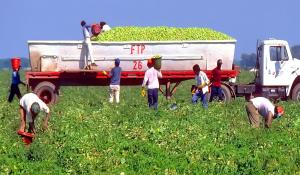
When you hear the word “sweatshop,” what comes to mind?
Most likely shadowy factories in faraway places like China or Bangladesh, where exploited workers are packed into small spaces with their machinery, breathing in dust-filled air and working 14- to 18-hour days for poverty-level wages. Anyone who has ever read about sweatshops knows that abusive working conditions are the norm in such places.
But they’re “over there,” not here in America, right? With our better labor and environmental laws, surely sweatshop conditions don’t occur on US soil?
It’s a popular myth that even the most knowledgeable Green Americans may believe. In fact, after Green America’s online editor Andrew Korfhage posted a link to a story on the Rana Plaza factory collapse in Bangladesh back in April, one commenter urged people to buy “Made in the USA” to avoid purchasing from companies that do business with sweatshops.
If only it were that easy. Unfortunately, exploiting workers—horrific, inhuman abuse—does occur in the US, and it’s more prevalent than you think.
“Fair Labor at Home,” the July/August issue of the Green American covers in-depth how workers in US restaurants, farm fields, domestic labor situations, and workplaces tied to national corporations like Walmart, McDonald’s, and Wendy’s are regularly subjected to sweaetshop-style working conditions. Because they may still be learning English or may be unfamiliar with US labor laws, recent immigrants, both documented and undocumented, are among the most exploited workers in the country, enduring wage theft, dangerous working conditions, discrimination, and even physical assaults.
In 2012, student guest workers from Latina America and Asia on J-1 cultural visas won a settlement against McDonald’s, which agreed to pay them $213,000 in stolen wages and $141,000 for health and safety violations the students endured in the workplace.
Warehouse Workers for Justice (WWJ), a coalition of workers at US warehouses in Walmart’s supply chain, has, to date, recovered over $700,000 in stolen wages through lawsuits against Walmart-contracted warehouse companies, with more suits pending. The majority of the workers are people of color, says WWJ’s Leah Fried, with up to half of them being immigrants.
And farmworkers picking tomatoes for Wendy’s say the company isn’t doing enough to protect workers from abuse and assault, and it hasn’t raised its wages of 50 cents per 32-pound bucket of tomatoes for 30 years. Almost all of the top fast food chains in the country have signed onto the Fair Food Program—an agreement spearheaded by the Coalition of Immokalee Workers in which they agree to pay a penny per pound premium to tomato pickers and implement real protections for workers. Wendy’s, however, is the lone holdout, and has faced campus protests in 2019 over their refusal to join the Program, which would guarantee that laborers are paid at least the local minimum wage.
The “Fair Labor at Home” Green American has more details on each of these cases. But imagine our editors’ surprise (not really) when, as we sent the issue to the printer, news broke that 7-11 was being investigated for luring more than 50 Pakistani immigrants into the country to work for 14 7-11 stores in New York and Virginia. Upon their arrival, the workers had to put in 100-hour workweeks (That’s right—at least 14-hour workdays.). In addition, they were forced to live in employer-owned boarding houses and had “rent” money deducted from their paychecks. In fact, the money that was left over was so miniscule that the New York Times referred to the scheme as a “modern-day plantation system.” The federal government is also investigating allegations that the 7-11 employers stole additional, “substantial” money from the workers’ paychecks.
The 7-11 franchise owners also stand accused of committing identity theft to give the workers false identifications and conceal their trafficking scheme. The 7-11 corporation did little to monitor the situation, even though its records showed that stores in two different states had several workers with the same name and Social Security number on their employee rolls.
7-11 stores in at least seven other states are under federal investigation for similar trafficking and labor violations.
As we noted in the Green American, “The immigrant rights movement is not about handouts, but about ensuring that every US immigrant’s situation is handled fairly and with compassion—and that exploitation of this vulnerable worker population comes to an end.”






